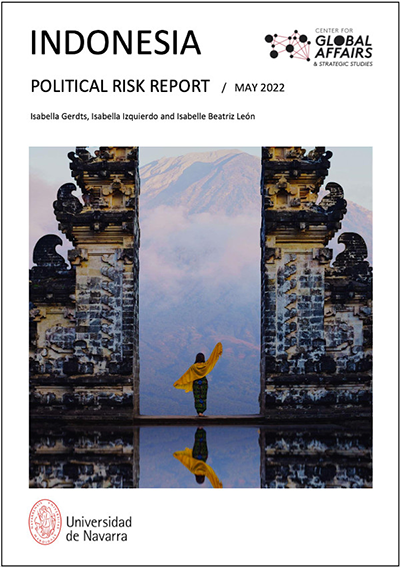En la imagen
The complex of Pura Lempuyang temple, in Bali, Indonesia [Krunja]
EXECUTIVE SUMMARY
Regarding the economy, the Indonesian government has spent more on short-term rather than long-term fiscal measures due to the urgent nature of the COVID-19 economic crisis therefore in 2023, the budget deficit is expected to be cut to 3% of GDP. However, Indonesia’s GDP is expected to increase to 5.9% in 2022 and 6.4% in 2023 assuming that new variants of the virus will not cause further disruptions and fiscal policies and monetary measures will remain stable boosting domestic consumption in the upcoming years. The archipelago’s inflation rate is in the indicated margins which translates into the gradual movement toward stable growth as productivity from the labor market improves. Indonesia is prioritizing economic growth by maintaining low-interest rates, bilateral and multilateral agreements, and implementing trade policies. However, the country has significant protectionist policies that hinder the achievement of its full potential.
In regards to the social outlook, it is important to highlight that Radical Islam has risen in the past two decades and the activism within radical Islam groups will presumably diminish or continue to be the same, but it will not upsurge as government efforts to combat them have shown results. Moreover, it is improbable that Sharia Law will be applied all throughout Indonesia and the separation of West Papua and the Independence of Aceh is unlikely to happen. Indonesia is a solid democracy, but it is still highly corrupt. Nonetheless, it is one of the few countries that has shown steady and gradual improvement in corruption. The next presidential elections will take place in 2024. Pranowo's electoral victory would probably establish a prominent coalition government based on a moderate approach and on liberal economic policies. However, if either Anies Baswedan or Prabowo Subianto wins, the political division between Islamists and Nationalists might get stronger, hindering social stability.
Indonesia will chair ASEAN in the coming year, making it an ideal opportunity to uphold its leadership in the region. The BRI can be a big opportunity if cautiously managed as the consequences of Chinese foreign investment could foster rejection and intolerance toward the Chinese-ethnic minority. The RCEP will contribute around $1 billion to Indonesia's trade surplus and will increase investment inflows by 1.7 billion by 2040. Finally, the Strait of Malacca will remain the most favorable route in the South East Asia region for the next decades, Indonesia will unlikely use the Straits of Sunda and Lombok for its leadership projection in the region.


